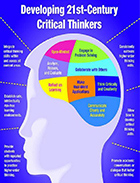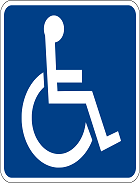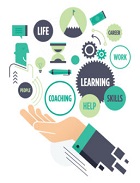The Advent of Digital Education
The Advent of Digital Education
 Digital education refers to any type of learning that takes place with the help of technology or by a mode of instruction that makes use of technology.
Digital education refers to any type of learning that takes place with the help of technology or by a mode of instruction that makes use of technology.How did this start?
Education has gone through a lot of changes in the past century. What started off as a chalk and board system slowly evolved to include notebooks and pencils, this graduated to a more sophisticated form where teachers started using green boards and white boards. Today, education has reached a juncture where it is in sync with technology. Teachers make use of technology to impart knowledge and share information. Lessons have become interesting with the advent of digitization. Digital education has become a buzz word in the past few years.
Education has gone through a lot of changes in the past century. What started off as a chalk and board system slowly evolved to include notebooks and pencils, this graduated to a more sophisticated form where teachers started using green boards and white boards. Today, education has reached a juncture where it is in sync with technology. Teachers make use of technology to impart knowledge and share information. Lessons have become interesting with the advent of digitization. Digital education has become a buzz word in the past few years.
Advantages of Digital Education:
-
It helps to enhance learning
Digital education helps teachers share more information with students. -
It helps students to be more informed
Provides students with a lot of information, keeping them well-informed. -
It helps to develop skills
Digital education helps develop skills like motor skills, decision making skills, improved academic performance and inventiveness.
-
It makes teaching flexible
Teachers can plan the lesson according their convenience. -
It encourages blended learning
Digital education encourages blended learning where the teacher can deliver a topic using various means, and by including many visual-aids.
Drawbacks of going digital:
-
 Distraction
Distraction
Technology in the classroom can cause distraction and hamper the learning experience. -
Reduced social interactions
Technology may bring down the interpersonal interactions. A combination of oral and digital education may reduce the effects of technology. -
Reduces efforts
Technology provides a plethora of information. Chances of copying increases, and students fail to put in their complete effort while completing an assignment or homework. -
Technology as a barrier
Technology can become a barrier when not used efficiently. The classroom should involve different modes of learning and should not be focused only on technology. -
Difficulty in adapting
Digital education may face resistance from teachers who have been using traditional teaching methods. Teachers may find it difficult to shift to a technology-based education all of a sudden.
Trends in Digital Education:
There are many developments in digital education like:
-
Online resources
Many websites have been created based on the school curriculum to explain the concepts in an easier way to the students. Lessons on various topics and for various classes have been created along with videos for the same. Such online platforms not only provide knowledge to children but also act as a platform to build connects.
-
VR
Virtual Reality (VR) is a concept that is being considered in the education space. Virtual Reality is one which stimulates real experience by use of computer technology. VR in education involves a headset, a user-friendly interface, gesture controls and a unique learning experience. A newer trend over VR is the Augmented Reality (AR) which combines real-time and computer-generated views to enhance user experience. -
Gamification
Gamification incorporates game-elements in the learning environment. This teaching methodology creates game like scenario around the course. -
Mobile based learning
Digitalization of education has even reached the mobile phones. Many applications have been developed to take concepts to students with an element of personalisation. Mobile based learning ensures convenience and self-paced learning. Most mobile learning applications also contain quizzes to test the learners’ knowledge and understanding. -
SMART classrooms
SMART classrooms are technologically enabled classrooms that are equipped with modern technology to enable better learning and teaching. SMART classrooms usually contain gadgets like laptops, computers, projector with screen, speakers, cameras and interactive board.
Technology in the education space has come a long way and is projected to develop even more. Making efficient use of technology will increase the knowledge and will make the students more confident.





















